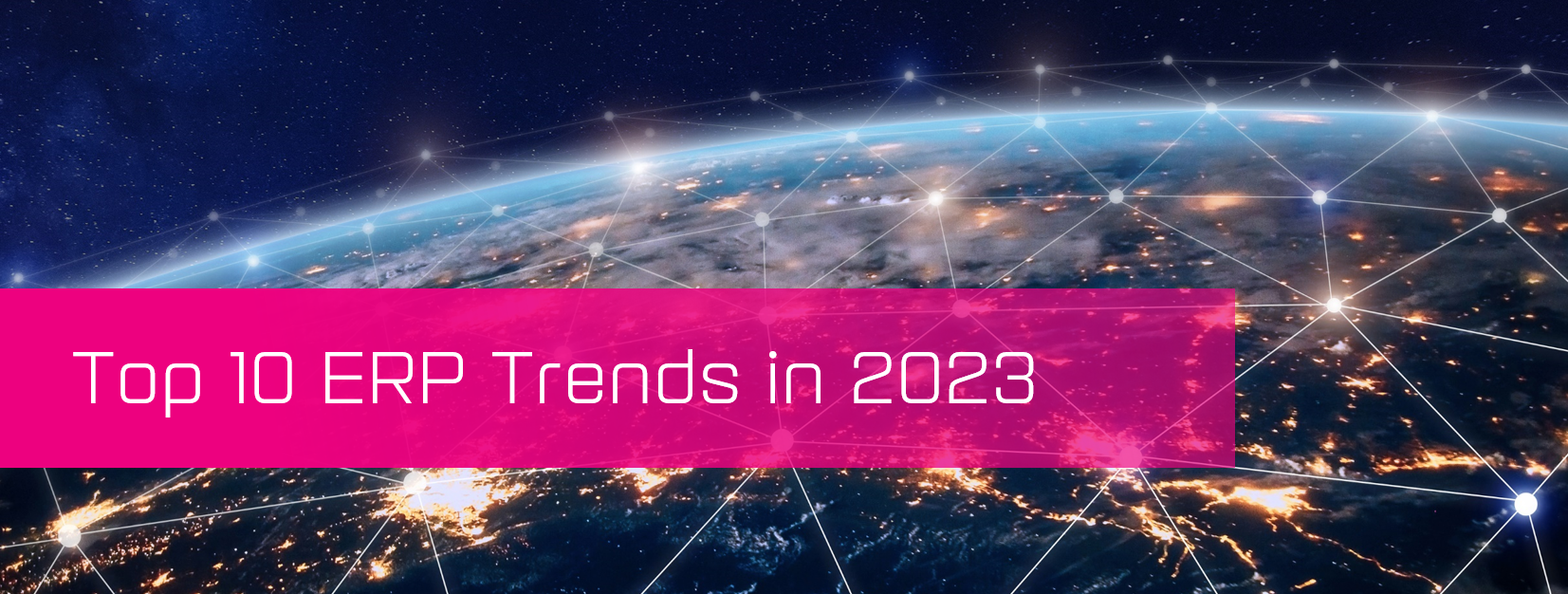
The rate at which digitalisation is taking place clearly highlights why it is crucial for businesses to get current and stay current with the latest software developments. The market has changed for good: tighter production timelines, increasing customer demands, and resource limitations are only some of the restrictions businesses must overcome. When you have a clear idea of where industry trends are headed, you can more accurately plan your business strategy and overcome these restrictions.
To help you prepare, our team have rounded up some of the biggest trends that we anticipate for the ERP industry in 2023.
1. A bigger shift to mobile
The increased move to remote working means that businesses need to meet the needs of a workforce that requires access to information any time, anywhere. A recent study found that 78% of businesses reported that their employees use mobile devices to access company- and work-related information. As a result, several features of ERP solutions are extending to mobile devices. Mobile ERP systems can support powerful functionalities beyond office or warehouse environments, adding considerable value to your business. Key stakeholders can be more proactive with their forecasting and analytics, and employees can have can have real-time updates about stock.
2. More cloud-based ERP
While systems like CRM have been in the cloud for many years, ERP is gradually moving away from on-prem and into the cloud as well. With this movement accelerating, many companies are investing more in cloud technology. Cloud solutions offer various benefits including the choice of a system fully located in the cloud, or deploying a hybrid model (which still offers your IT team a degree of control). On the other hand, many businesses still use on-prem legacy systems that are becoming obsolete, which cause them to struggle to keep up with advancing technologies.
3. Advancements in ERP intelligence
As ERP solutions become more advanced, more platforms are starting to incorporate technologies like Artificial Intelligence (AI), Machine Learning (ML), and Robotic Process Automation (RPA). Combined, AI and ML can help businesses extract higher quality data, cut unnecessary costs, get more value from their data, and improve their forecasting.
In the ERP space, AI, ML, and RPA can take over tasks that normally needed to be performed by people. Effective implementation of an intelligence solution can help reduce human error, save costs, and free up time for your employees to focus on value-generating areas of your business.
4. Increased focus to deploy IoT
Customers increasingly expect companies to deliver more personalised, customised experiences. This relies heavily on effective data input on the business side. IoT devices that speak to each other can significantly simplify data collection from a myriad of channels. Investing in IoT will enable businesses to more effectively manage their BI, deliver tailored customer experiences, and allows for potential to connect to other systems they might want to add on in future.
5. A bigger need for industry-specific solutions
Every industry is unique and the increasing demand for ERP software means a ‘one-size-fits-all’ solution is no longer the answer. Leading ERP providers are offering more industry-specific functionalities and features, which means that there are less costs associated with customisation, which leads to faster implementation and deployment.
6. More focus on security
The shift to remote working has resulted in an increase in cyber attacks, data breaches, and challenges in data security. Systems like ERP that process vast amounts of data and link to systems like CRM, face significant threat and are often not equipped to handle the security issues presented by remote working. As a result, many businesses are intensifying their efforts to secure their ERP systems – especially with new data privacy laws that have come into effect and recent high-profile data breach incidents that have come under the spotlight.
7. Two-tier ERP
IoT, cloud infrastructure, and big data are some of the integral parts of ERP that are developing at breakneck speed. How can businesses keep up? Many larger businesses have started to find that their existing ERP solution cannot effectively deliver on all their business requirements. There might be different ERP usage requirements at headquarters, regional, and subsidiary levels, for example.
This has led to the implementation of two-tier ERP – it enables businesses to use their current ERP solution at corporate level (tier one), while operating its units and subsidiaries on a separate ERP solution (tier two). In terms of licensing fees and maintenance costs, this type of strategy needs to be carefully considered. That said, the degree to which it can be purpose-built for your industry-specific needs, is a benefit that’s hard to ignore.
8. Fully-integrated ERP
As businesses continue to evolve, integration between systems and processes naturally follows. At the centre of this integration, are ERP applications – they allow you to manage various areas of your business from one application. This means all the way from your stock levels, through to your accounting records, to your CRM, you’re able to share data more effectively throughout your business, and make more data-driven decisions.
9. Plug- ‘n-play ERP integration
With the rise in cloud ERP adoption, we predict that integration using standard APIs will be a new trend. You could encounter a customer using a core ERP solution for their main business processes, but using another vendor’s solutions for more specific requirements. An example would be a wholesaler using K8 for their distribution process, a 3rd-party CRM, and an independent sourcing solution. Customers will increasingly expect ERP service providers to be able to provide seamless integration between these different solutions.
10. ERP will continue to evolve
In previous years, ERP systems were mainly designed for large-scale manufacturing and distribution environments. As the global market continues to evolve, ERP solutions are increasingly being used by a wider variety of industries, like Retail and Finance. We predict that ERP solutions will continue to become more integrated to support global operations, and become more tailored as specific industries’ unique needs continue to develop.